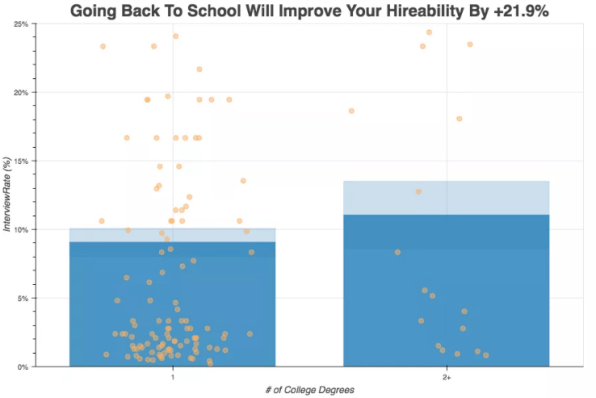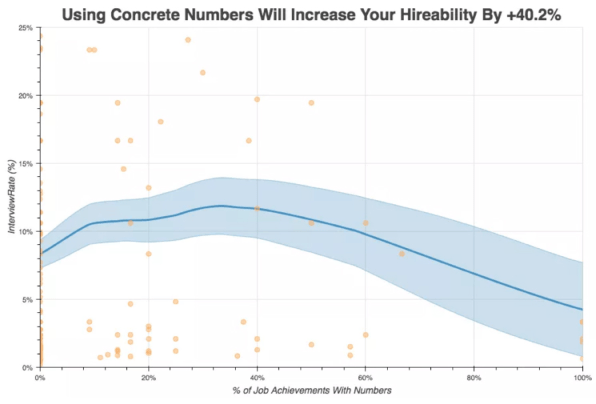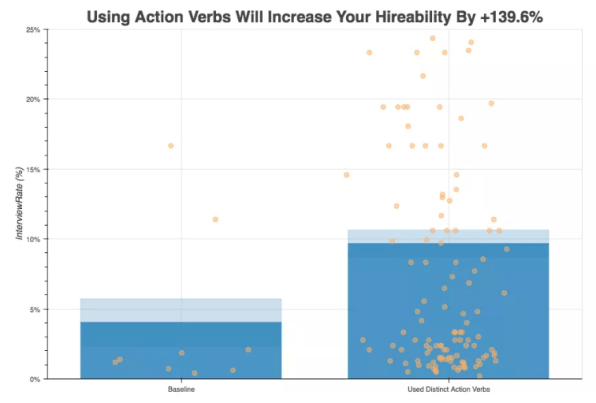Your #Career : Here’s Exactly What To Put On Your #Resume To Land An #Interview (And What to Leave Off)… Maybe Getting another #CollegeDegree or Adding an #Internship isn’t the Best Way to #LandaJob . Perhaps you just Need to Update your Resume with a Few #Stats & #KeyWords.
While resumes are often written to appeal to a hiring manager, few are ever actually viewed by a human. “Companies, more and more, are using automated screening systems to make it cheaper and faster for them, which grossly dehumanizes the process,” said Kushal Chakrabarti, CEO and cofounder of TalentWorks, an AI-driven resume optimization and job search platform.
“That means that the first filter for a lot of people isn’t actually a person looking at their resume, it’s a robot seeing whether or not you included a keyword, scoring your resume to decide if a human should even look at it.”
As a result, Chakrabarti has found numerous ways candidates can better stand out to hiring managers and automated tools.
Over the past few months TalentWorks has tracked 4,068 job seekers across 541 distinct locations and industries to determine the resume factors that had the greatest impact in landing an interview.
Related: How To Trick The Robots And Get Your Resume In Front Of Recruiters
GOING BACK TO SCHOOL DOESN’T HELP YOU THAT MUCH
The study found that those who had a second college degree saw their chances of getting an interview increase by an average of 21.9%; a modest improvement compared to other, far less costly, and time-consuming resume touch-ups.

“There is fundamentally different hireability improvements associated with different majors, but within any one industry, there’s often a lot you can do that’s more effective than going back to school,” said Chakrabarti, explaining that if you want to switch careers, getting a degree in a new field can help, but getting an advanced degree within your field likely isn’t worth it.
REMOVE BUZZWORDS LIKE “TEAM PLAYER”
Counterintuitive as it may sound, those who frequently mention buzzwords associated with collaboration–such as “team player,” “supporting member,” or “participated”–are often penalized by hiring managers. In fact, candidates with more than one or two mentions of these buzzwords on their resumes are 50.8% less likely to be called in for an interview, according to TalentWorks research.
“As a hiring manager, I’m looking for reasons to disqualify you,” explains Chakrabarti. “If I see a resume that talks a lot about collaboration, I will think this person probably didn’t have much of an impact.”
Related: This Is The Part Of Your Resume That Recruiters Look At First
INSTEAD, USE NUMBERS AND CONCRETE FACTS
While being a “team player” can signal a minimal or insignificant contribution, concrete numbers have the exact opposite effect. In fact, demonstrating results using numbers increases a candidate’s likelihood of being interviewed by 40.2%, according to the TalentWorks research.

“Saying you’re a ‘leader’ doesn’t prove anything; explaining how you led your team to achieve 120% of their quota demonstrates your aptitude in leadership,” explained Amanda Augustine, a career advice expert at professional resume writing service TopResume. “Recruiters care about measurable success. If you were successful in a similar role in the past and able to deliver results, they assume you’ll perform successfully for their client or team, too.”
ADD A KEY SKILLS SECTION
While collaboration-focused buzzwords like “team player” can cause hiring managers to question the extent of your contribution, industry-specific buzzwords can serve to demonstrate a deeper understanding of a given field. In fact, adding 15 to 20 buzzwords, acronyms, and relevant key skills will increase the likelihood of being interviewed by 58.8%, according to TalnetWorks’ research.
Furthermore, since today’s gatekeepers take the form of keyword-seeking robots and potentially fatigued hiring managers, Augustine says adding a key skills section to the top of their resume can help applicants stand out to both.
“This skills section is one of the major factors in determining whether or not your application passes the initial gatekeeper and reaches a human being,” she says. “If specific skills are routinely being mentioned as requirements for the position, be sure to include them in your key skills section and incorporate them throughout your resume.”
START EVERY SENTENCE WITH DIFFERENT ACTION VERBS
Overall, the single most effective way of improving the likelihood of being interviewed for a position, according to TalentWorks’s study, is by starting every sentence with distinct action verbs. Doing so has been found to increase the likelihood of landing an interview by 139.6%–nearly seven times more than going back to school.

Chakrabarti adds that this finding demonstrates the overall theme of the research, which is that softer, flimsier claims are often punished, while strong, specific descriptions are rewarded.“If you give me soft language and weasel words, I don’t really know what do with that [as a hiring manager],” he explained. “If you can really make it concrete and make it real for me, that goes a really long way in giving me the information I need to hire you.”
FastCompany.com | January 18, 2018 | BY JARED LINDZON 4 MINUTE READ
[/fusion_builder_column][/fusion_builder_row][/fusion_builder_container]





















